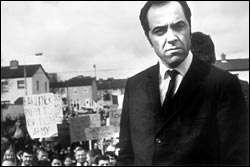I give up. There are almost too many mini-film festivals this week to keep track of. Everyone’s dropping off tapes at the office, and there aren’t enough hours in the day to watch them all. Based on what went into the VCR, however, here’s how to make sense of March’s festival insanity.
First up: Jews! With some 30 titles on its schedule, the Seattle Jewish Film Festival runs at Cinerama from Saturday, March 8 through Sunday, March 16 (tickets and info: 206-325-6500 and www.ajcseattle.org). Opening night is Nowhere in Africa (7:30 p.m. Saturday, March 8), which takes a sidelong approach to the Holocaust in the autobiographically inspired tale of a family that escaped Germany for Kenya in 1938. There, broke and homeless, the mother and father must cope with a flawed marriage, while their young daughter blossomsquickly learning Swahili and discovering the pleasure of kneading her bare toes in warm cow pies. Grim news comes by radio and mail from Europe, as the Redlich clan does what it must to survive. It’s a good film that opens its regular run March 28.
Among other first-week highlights, back from SIFF ’02, is Yellow Asphalt (8:45 p.m. Tuesday, March 11), a searing three-chapter anthology film about the nomadic Bedouin tribes living in the West Bank. In the third and longest segment, an Israeli farmer’s adultery with his Bedouin maid leads inexorably to blood and atonement, like a film noir in broad daylight. The Bedouins’ unforgiving moral code gives dignity to their tribe but keeps it obdurately apart in a fast-modernizing country. Says one elder, “To live in both worlds . . . that cannot be done.”
If you loved Audrey Tautou in Am鬩e . . . rent Am鬩e again. Her turn in the middling romantic comedy God Is Great (7:30 p.m. Sunday, March 9) mainly makes you wonder why her Jewish veterinarian boyfriend puts up with her air-headed fashion-model character. “You’re not Jewish enough,” the overearnest goy tells him while studying to convert to his faith. (Don’t let her! Haven’t the Jews suffered enough?) Also, it’s hard to get used to Tautou without the Am鬩e wig.
Of the documentary Israel in a Time of Terror (4 p.m. Sunday, March 9), our Mark D. Fefer writes, “After a gratuitous montage of suicide-bomb-aftermath footage set to music, this no-frills doc then settles into some tightly edited man/woman-on-the-street interviews about what it’s like to live under a different kind of occupationthe kind in which sending your daughter out to the grocery store can mean sending her to a sudden violent death. It’s refreshingand handyto have an American interviewer (conservative radio talker Dennis Prager) who actually knows the language of his hosts, and the film is often quite moving. But at 26 minutes, it also can’t help seeming random and scattershot. This is a good start on a subject deserving much more comprehensive treatment.”

Karoline Eckertz in Nowhere in Africa.
photo: Bavaria/Zeitgeist |
Next up: Africa! The Northwest Festival of African Cinema offers some 17 films from Wednesday, March 5 through Thursday, March 13 at 911 Media Arts Center, Seattle Art Museum, and Rainier Valley Cultural Center (info: www.rakumi.org). Waiting for Happiness opens the fest (7:30 p.m. Wednesday, March 5, SAM), and waiting is certainly the right word for it. In a town on the sandy, windswept coast of Mauritania, locals while away the hours with a langorous rhythm. A little girl learns haunting Arabic songs; a brooding, Westernized teenager waits to return to France, scarcely leaving his room; an electrician and son install wiring that never seems to work. They live on the Saharan intersection between Arab and African cultures where several languages are spoken. Europeand the prospect of better jobsseems both near and far. Everyone feels the pull, but no one wants to leave their homeland. Slow but occasionally beautiful, the film indirectly asks whether Africa’s future lies in Africa or in diaspora.
One of our picks at SIFF ’01, Little Senegal (7:20 p.m. Wednesday, March 12, SAM) is also worth seeing. Visiting N.Y.C. to track down a distant relative, aged, scholarly Senegalese Alloune discovers a cultural rift between blacks long settled in the U.S. and more-stable recent African immigrants. “We’re too black for them,” his cynical cousin says about suspicious African Americans. Although predictable, Senegal slowlyslowlywins you over. Alloune is so sage, noble, and dignified as to seem a stereotype, but so, perhaps, are all heroes. (Look for several nods to another family quest film, John Ford’s The Searchers.)
Last up: Ireland! The Irish Reels Film Festival runs Thursday, March 6 through Sunday, March 16 at multiple venues (info: 206-722-2184 and www.irishreels.org). The big selling point here is Bloody Sunday (8:30 p.m. Saturday, March 8, SAM), which made my 10-best list for ’02 yet was ineligible for the Oscars because it played once on British TV. It’s a docudrama re-creation of Jan. 30, 1972, a date fixed in Irish memory, when 13 civil-rights marchers in Derry were killed by British paratroopers. In a disorienting whirlwind of editing that spans 24 hours, Sunday introduces four key players and perhaps 40 recognizable faces, but it’s a film without heroes. This happens and then that happens, until events take on their own terrible logic. (Don Mullan, on whose book the film is based, will attend the screening.)
Photos to Send (6 p.m. Saturday, March 8, SAM) is a documentary that retraces the 1954 journey of American photographer Dorothea Lang through Ireland while she was on assignment for Life magazine. Her original photos are much better than the documentary, although there’s poignancy in meeting some of her subjects more than four decades later.
Unseen is the festival opener, Goldfish Memory (7 p.m. Thursday, March 6, Harvard Exit), a romantic comedy set in Dublin’s young singles scene. We’re guessing that, as with young singles here, they do lots of party drugs, have lots of sex, and wear their baseball caps backward.








